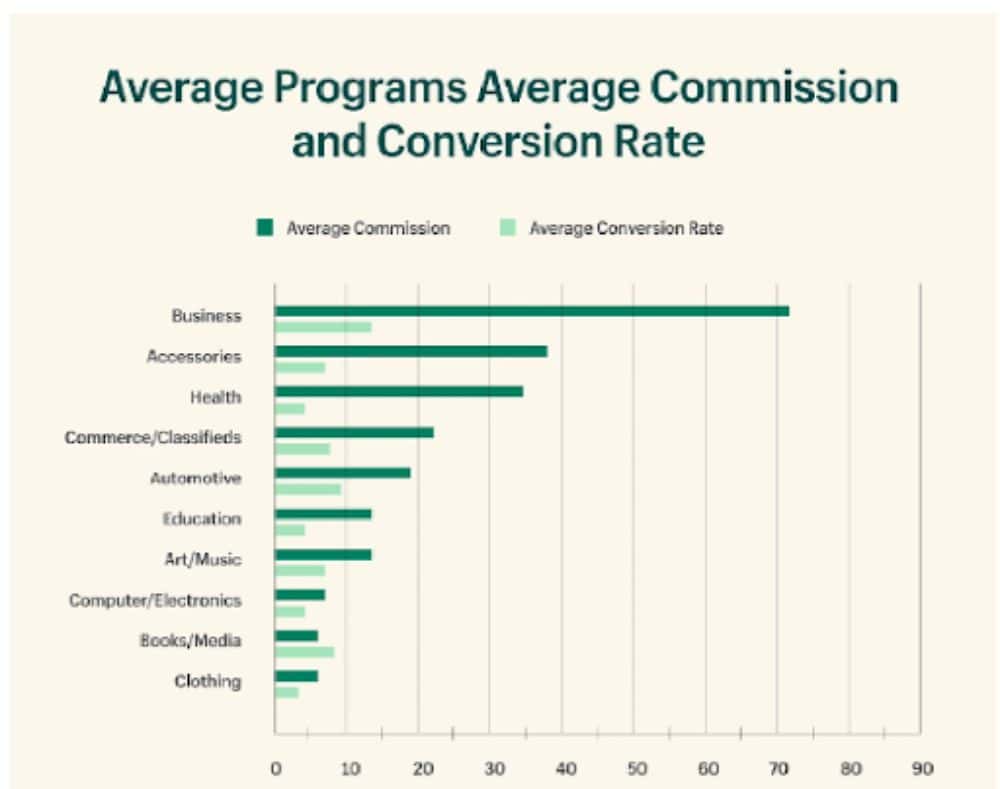Affiliate marketing is a method used to generate extra income. One option is to become an affiliate marketer and promote other brands, while another option is to start your own affiliate program to promote your brand.

Affiliate marketing presents a mutually beneficial opportunity for both brands and creators. Brands can tap into new audiences and receive trusted referrals, while affiliates and creators earn a commission for generated sales or marketing actions through affiliate links.
This comprehensive guide provides step-by-step instructions on becoming an affiliate marketer, promoting other brands, and generating income through affiliate marketing. It includes tips on starting and managing a successful affiliate program, as well as best practices for increasing earnings.
What is affiliate marketing?
Affiliate marketing involves publishers earning a commission by promoting products or services from retailers or advertisers through affiliate links, and receiving a payout for generating specific results.
Affiliate marketing programs often offer compensation for sales, and some may also reward other actions like generating leads or driving website clicks.
An affiliate network is a platform that facilitates connections between creators or influencers and various brands’ affiliate programs.
Affiliate programs typically have no cost to join. When executed effectively, an affiliate marketing strategy can transition from a part-time endeavor to a lucrative online business opportunity that produces passive income.
How affiliate marketing works
Affiliate programs involve individuals or businesses promoting and selling products or services of a company in exchange for commissions on each sale made through their unique affiliate link.
- This is an overview of how affiliate marketing operates.
- An affiliate displays advertisements or links for Store Z on their website, blog, or social network.
- The customer clicks on the affiliate link.
- A purchase is made by the customer at Store Z.
- The transaction is recorded by the affiliate network.
- The purchase has been confirmed by Store Z.
- The affiliate receives a payment in commission.
Commission rates for affiliate sales can vary greatly depending on the company and offer. It is possible to earn anywhere from around 5% to as much as 50% with certain high ticket affiliate programs. Additionally, some affiliate marketing programs offer a flat rate per sale instead of a percentage.
3 types of affiliate marketing

1. Unattached affiliate marketing
One type of affiliate marketing, known as “unattached,” occurs when the affiliate has no authority in the product’s niche, resulting in no connection with the customer. This usually involves running PPC advertising campaigns with the affiliate link in the hopes of generating clicks, sales, and earning commissions.
Unattached affiliate marketing is appealing due to the lack of legwork required. Affiliate marketing businesses depend on reputation and trust within an online target audience. For some affiliate marketers who lack the time or interest in building these relationships, this type of marketing is the preferred choice.
Elise Dopson, founder of Sprocker Lovers, states that unattached affiliate marketing is not a legitimate business model, as it is primarily used by individuals looking to earn income.
2. Related affiliate marketing
Related affiliate marketing involves promoting products and services within your niche that you may not personally use. Affiliate marketers with an audience on platforms like blogging, YouTube, or TikTok are able to recommend these products based on their influence and credibility.
Affiliate marketing with related products can increase income but carries the risk of promoting untested items. Recommending a bad product can harm trust with your audience. Trust and transparency are crucial for a successful affiliate marketing business.
3. Involved affiliate marketing
Elise recommends involved affiliate marketing, which involves promoting products and services that the affiliate marketer has personally used and believes in. This approach is based on trust and authenticity, benefiting both the audience and the business.
In this form of marketing, affiliate marketers leverage their influence to promote products and services that align with their followers’ needs, rather than relying on paid banner ads for clicks. Developing credibility with an audience takes time but is crucial for establishing a successful and enduring business.
Elise suggests that taking an involved approach makes advertising easier for affiliate marketing partners. Instead of relying on expensive PPC ads, sharing an organic Instagram Story or blog post about your experience with a product can be more effective in building trust and credibility with your audience.

Pros and cons of affiliate marketing
Affiliate marketing pros
Easy to execute
Your role in this equation focuses on managing the digital marketing aspect of product development and sales, while leaving tasks such as development, support, and fulfillment to others.
Low risk
Ability to scale
Affiliate marketing has the potential to increase earnings without the need to hire extra help. By introducing new products to your audience and creating campaigns for additional products, you can continue to generate affiliate revenue while your existing work runs in the background.
Successful affiliate marketing is established on trust. It is recommended to only promote products or services that you personally use or would endorse. While there are numerous products available for promotion, it requires dedication and effort to become a successful affiliate marketer for a particular product.
Affiliate marketing cons
Requires patience
Affiliate marketing is a long-term strategy that requires time and patience to build an audience and establish influence.
It is recommended to experiment with various channels to determine the ones that resonate most with your audience. Conduct research to identify the most relevant and trustworthy products to endorse. Dedicate time to blogging, sharing free content on social media, organizing virtual events, and engaging in other lead-generating activities across your marketing channels.
Commission-based
As an affiliate marketer, you are typically compensated on a commission basis, depending on leads, clicks, or sales. There is no traditional weekly paycheck from a boss in this line of work.
Companies utilize temporary browser cookies to monitor individuals’ actions on their content. Upon completion of a desired action, a payout is received.
No control over program
Why be an affiliate marketer?
Affiliate marketing is a commonly used passive income strategy for entrepreneurs, creators, and established businesses, although there may be some drawbacks.
Here are two main reasons.
- One can establish an affiliate business with minimal expenses independently.
- Affiliate marketing allows creators to earn additional income through their skills.
1. Start a business on a budget
Affiliate marketers are not responsible for product creation, shipping, fulfillment, or retail store management tasks.
In affiliate marketing, expenses are lower compared to other ecommerce models as the focus is mainly on marketing and the costs involved are minimal, such as purchasing apps and software for creating online content.
Affiliate marketing is considered an appealing option for those seeking cost-effective startup ideas or opportunities to earn money from home.
2. Monetize your talents
Affiliate marketing enables individuals to earn money by leveraging their existing skills, such as content marketing, search engine optimization, or social media influence, to promote the products of an affiliate partner.
Creators have the option to use affiliate links to generate support for their platform, such as podcasts, YouTube channels, or blogs. Partnering with brands can help creators introduce their audience to products that align with their interests. For instance, a podcast focusing on wellness could collaborate with brands offering vitamin supplements, meditation apps, or luxury mattresses.
Who should be an affiliate marketer?
To succeed in affiliate marketing, it is necessary to master the core skills.
Explore additional information on partner websites by clicking on links for informative content.
Improve a website’s search engine ranking by incorporating relevant keywords.
Create a method for selecting affiliate partners and products.
Enhance affiliate commissions through successful negotiation.
Affiliate marketing is considered one of the most accessible ecommerce business models. By selecting a product niche and affiliate partners wisely, and creating engaging content to attract customers, it has the potential to generate significant income.
How do affiliate marketers make money?
Affiliate marketing income varies widely, with some earning a few hundred dollars per month and others making six figures annually. Your potential earnings as an affiliate marketer increase with the size of your following.
According to data from Payscale, the average annual salary of affiliate marketers is over $55,000, with many earning higher amounts based on a sample of over 7,000 salary profiles.
Affiliate marketing payment models
When selecting an affiliate program to promote, you will encounter various payment models, which companies may refer to as price models, payout models, conversion types, or other variations.
The payment model dictates which actions will result in payment, such as a free trial signup for promoting software products or a purchase for promoting physical products as an affiliate marketer.
Many affiliate marketing programs use last-click marketing attribution, where the affiliate who gets the final click before a purchase receives full credit. However, this trend is shifting as affiliate programs enhance attribution models and reporting. For instance, credit for a sale may be shared equally among multiple affiliates in a buyer’s conversion funnel.
Five common ways affiliates get paid include:
- One common payout model for ecommerce offers is pay per sale, where a commission is earned for each sale made.
- Pay per action is a common affiliate payout model where you earn a commission for specific actions such as newsletter signups, clicks, contact requests, and form submissions.
- Pay-per-install is a payment model where you receive compensation for each installation that originates from your website traffic. The objective of your content is to promote mobile apps and software in order to increase downloads and installations.
- Pay per lead pays you every time someone signs up for something. Companies use it for sweepstakes, lead generation, and other offers. Cost per lead offers are popular for beginners because it’s easier to generate leads than to sell products to an audience.
- Pay per click is a payout system where you earn commission for every click on your affiliate link. This system is rare and used by big merchants to build brand awareness. Customers do not need to sign up or make a purchase, just visit the merchant’s website.
The amount of money you can earn through affiliate marketing varies depending on the niche you choose. According to research by Shopify in 2021, business-related programs had the highest average commission rate at $70.99, while books and media and clothing categories earned just over $6 per commission. The maximum average commission found was around $289.06 per sale.

How to start affiliate marketing in 4 steps
- Pick your platform and method
- Determine your niche and audience
- Find your products
- Choose your first affiliate program
1. Pick your platform and method
When starting out as an affiliate marketer, it’s important to consider the platform you want to use to build your audience. Different marketers have varying approaches and platforms, with numerous affiliate marketing ideas to choose from based on different methods.
- Niche topic and review sites focus on evaluating products for a specific target audience or comparing them to competitors. To be successful in this method, consistent content creation related to product reviews is necessary to attract and engage an audience.
- Digital content is created by individuals such as bloggers, YouTubers, and social media influencers. They create content that appeals to a specific audience. The aim is to introduce niche products to their audience in a natural way, increasing the likelihood of a purchase and earning an affiliate commission.
- For educators, integrating affiliate partnership offers into courses, events, and workshops can be a valuable opportunity.
Authenticity and audience building are essential elements for affiliate marketing. Without a genuine connection with your audience, converting them into affiliate sales may be challenging.
Consider your most frequently used platforms and the ones you are most comfortable with when choosing a platform and method.
Common platforms affiliate marketers use are:
- Blogging
- TikTok
- Pay per click (PPC)
- YouTube
Beginning with a familiar marketing platform can aid in producing top-notch content, potentially leading to a more engaged audience and increased sales.
2. Determine your niche and audience
When selecting a niche, it is beneficial to focus on something you are passionate and well-informed about. This can enhance your credibility and position you as a reliable source of information for potential clients. It also allows you to assess the products and brands you wish to endorse.
Consider starting a blog focused on dogs, offering guidance to owners on pet care.
The focus of your content is on dogs, and you plan to utilize content marketing and SEO strategies to expand your audience and promote subscription to your email list.
Elise explains that the niche chosen for an affiliate site dictates the level of time and effort required to build it up to a point where SEO results are noticeable. She points out that industries such as software, marketing, and health care are heavily saturated with large blogging sites and substantial marketing budgets. The key lies in identifying undiscovered niches with lesser competition, and entering them before others catch on.
By utilizing affiliate marketing tools such as social listening, website analytics, and social media insights, you can better understand your audience and their preferences as you increase your posting frequency.
In affiliate marketing, you are not paid to post. It is a performance-based online business. Understanding your audience is key to success. Knowing why they follow you allows you to recommend products they will like and earn more affiliate income.
3. Find your products
In order to generate income as an affiliate marketer, it is crucial for your audience to resonate with your content. Promoting products or services that align with their interests is key to success and maintaining credibility with your audience. Failure to do so can negatively impact your results and reputation.
For those seeking products or brands to collaborate with, there are numerous affiliate networks and marketplaces available.
- Affiliate Future
- AvantLink
- CJ
- ClickBank
- FlexOffers
- LinkConnector
- ShareASale
You can also check the websites of the products and services you enjoy to see if they offer affiliate programs. Many large companies promote their programs on their site, like the Shopify Affiliate Program.
Consider reaching out to the owner of a product that interests you to inquire about potential affiliate marketing opportunities. If they do not currently have a program in place, they may be open to exploring options such as providing you with a unique coupon code for your audience.
Finding the best deals usually involves being proactive and having a relevant platform, like reaching out to the seller of a new fitness product if you’re a health and wellness blogger.
Affiliate marketing programs have terms of service that must be adhered to, so it is important to carefully read the details. For instance, affiliate links typically contain a cookie with a designated duration, and some programs may prohibit the use of pay-per-click ads featuring the product or company name.
4. Choose your first affiliate program
When considering products or affiliate programs, make sure they align with your audience. Ask yourself if it would be valuable to your target audience. Consider if it fits with your area of expertise. Select an affiliate program that matches your brand and income goals.
When promoting a product or service, it is important to consider the platform you are using. For instance, image-heavy platforms like Instagram are ideal for promoting home décor and clothing, while longer-form platforms like blogs or YouTube may be more effective for promoting software and other in-depth purchases.
Tips for affiliate marketing success
- Build trust
- Talk to a product expert
- Create a product tutorial
- Build an email list
- Find relevant search terms
- Consider your angle
- Set your distribution strategy
- Try offering a bonus
- Keep things legal and above board
Affiliate marketing revenue has the potential to become a form of passive income, although it requires initial effort. The following tips can aid in achieving success with affiliate marketing.
Build trust
When writing a review, it is important to provide an honest opinion based on personal experience and product knowledge. Transparency and authenticity can help build trust with readers seeking advice on the product.
Trust is an essential element in affiliate marketing, as it plays a crucial role in influencing people to act on your recommendations. The level of trust required to drive affiliate sales varies depending on the industry and products being promoted. For instance, promoting a $1,000 course requires a higher level of trust compared to promoting a $20 t-shirt.
Desirae Odjick, who previously ran the personal finance blog Half Banked before it was acquired, suggests that to build trust as an affiliate, it’s important to limit the number of products you promote and focus on ones you personally use within your area of expertise. For example, she found success in recommending Canadian financial apps but acknowledges that she may not have had the same success as a Sephora affiliate.
Talk to a product expert
Create a product tutorial
Success in affiliate marketing can be influenced by the size of your following, but driving traffic can also be achieved by providing tutorials on the offer.
Many individuals frequently conduct Google searches for “how to” guides, such as “how to save money for college” or “how to decorate a laundry room.” By providing a tutorial that addresses the searcher’s issue and effectively demonstrates the product’s value, your referrals will be more relevant and compelling to customers, increasing the likelihood of a purchase.
Build an email list
An email list is a collection of contacts who have opted to receive information from you. Building a contact list is essential for reaching people beyond social media, as email has the highest conversion rate (66%) for purchases resulting from marketing messages compared to other channels.
Collect email addresses from your content, then regularly send a newsletter with relevant updates and promotions. Affiliate marketers can provide a variety of content and offers for their subscribers.
- Free downloads
- Reports
- New blog posts
- A look inside your life or business
- Entertaining stories
- Reminders and news
- Special deals
Utilize your email list to provide value to subscribers. Respond to any emails they send back to you. Maintain consistency in your newsletter schedule and content quality. Occasionally, promote affiliate products to subscribers.
There is no set rule for how often promotional emails should be sent. It is best not send them excessively, as it may lead recipients into perceiving them as spam. Providing valuable content through promoting good products once a month can benefit subscribers who may have a need for them.
Find relevant search terms
Consider your angle
Consider the level of investment in instructional or tutorial content based on the specific offer, as it can serve as a helpful introduction for users interested in trying out a product.
One way to showcase a product is by creating a video demonstrating its features and benefits, such as unboxing a physical item or showcasing the functionality of a digital product like software.
Set your distribution strategy
Try offering a bonus
Marketers may promote their affiliate programs by providing bonuses, such as offering a free ebook to customers who make a purchase.
Promotions can influence customers’ purchasing decisions by providing additional value. Offering a bonus that is a regular item for sale can be particularly effective, as customers can easily see its monetary worth on your website.
Marie Forleo’s B-School for entrepreneurs offers affiliate bonuses, such as a one-on-one copywriting session with Laura Belgray, to encourage sign-ups through affiliate links.
Keep things legal and above board
Remember to inform your followers about affiliate links in your post. It is a requirement by the FTC and can also help you establish transparency with your audience.
Frugalwoods discloses that they may include affiliate endorsements and advertisements on their site. If you click on a link and make a purchase, Frugalwoods may receive a percentage of the sale. They only promote products they believe in and promise to avoid promoting products they find unsatisfactory.
Consulting a lawyer can be helpful in determining the appropriate language to use in a disclaimer.
Frequently Asked Questions
Can you truly earn money with affiliate marketing?
Affiliate marketing is a legitimate method of earning money online that requires hard work, dedication, and the right knowledge.
In order to succeed in this industry, it is important to understand how to utilize technology, connect with potential customers, and establish strong relationships with partners.
Is it hard to be an affiliate marketer?
Trial and error is a significant aspect of this business, with the need to test multiple offers, create ads and landing pages, manage affiliate marketing spend, and optimize campaigns.
With time and the use of appropriate technology such as trackers, optimizers, spy tools, and LP builders, adjusting to it will become easier.





